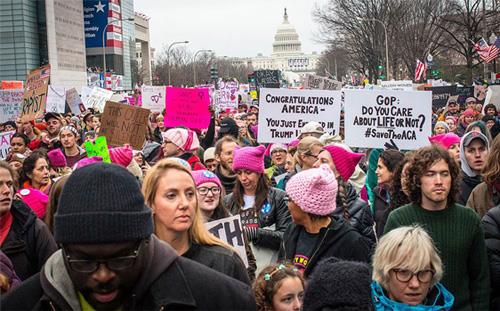
The longer you hang around, the more you realize that few socio-political battles are won for good. There's almost always someone trying to push you back to where you were.
That applies to women's rights, among many other things, and frankly, it sounds like a depressing premise.
In Not Done: Women Remaking America, which premieres Tuesday at 8 p.m. ET on PBS (check local listings), it's framed more as a wakeup call.
Part of the Verizon Media Makers series and the first film directed by Sara Wolitzky, Not Done recounts how, a few years back, many women activists feared the fruits of the centuries-long struggle for gender equality and respect were being taken for granted by the incoming generation. Daughters of yesterday's fighters saw "feminism" as yesterday's news.
They assumed the battle was won and they could just enjoy the fruit and freedom of victory.
Then troubling things started happening, like the country electing a president who bragged about how women loved to have him grab them. And Harvey Weinstein, the alpha movie mogul who was accused of crude sexual assaults by dozens of women, sparking a flood of similar reports that toppled TV stars, industry leaders, and a U.S. senator.
The day after Donald Trump was inaugurated as president, hundreds of thousands of women joined a march in Washington, basically declaring they and their rights would be ignored or eroded at the peril of any legislator or public official so inclined.
There was some concern that despite the size of the demonstration, it would follow the pattern of similar public events: big news for a week, then supplanted by whatever shiny news object came next.
That concern was alleviated less than two years later when an unprecedented wave of women was elected to Congress. Those women were not monolithic, but in all cases their election underscored how political parties and voters were no longer automatically placing their trust in white men.
Equally or more significant, Not Done commentators like Gloria Steinem, Shonda Rhimes, Natalie Portman, and more than a dozen others argue women have quietly, or not so quietly, moved to the forefront of movements that in the past would have been dominated by men.
Protests over the deaths of Trayvon Martin, George Floyd, and Breonna Taylor, as well as the whole Black Lives Matter movement, have prominently included women's groups and female leaders.
The U.S. women's soccer team led a campaign for equal pay. Teenage girls became forefront spokespersons in the Parkland school shooting and the international battle to combat climate change.
This does not suggest a mighty river of victories has been flowing. Hillary Clinton's loss of the 2016 election shocked and depressed many women who were convinced there would finally be a Madam President.
The confirmation of Amy Coney Barrett to the Supreme Court just this week sent a similar chill through many women activists. It keeps a woman in the seat of the late Justice Ruth Bader Ginsberg – but a woman who, among other things, seems poised to help strike down Roe V. Wade and allow states to criminalize abortion.
Losing the right to choose would be a long step backward in what has been seen as a gradual long-term expansion of women's rights.
Nonetheless, Not Done generally maintains a tone of cautious optimism. It suggests a new wave of activists, inclusive of more persons of color as well as the LGBTQ community, has tapped into a young, diverse base that can energize a multi-front battle going forward.
Not Done embraces the premise that it's simply harder to be a girl or a woman than it is to be a boy or a man. The ultimate point of the battle is to make it less challenging, and that battle is, well, not done.